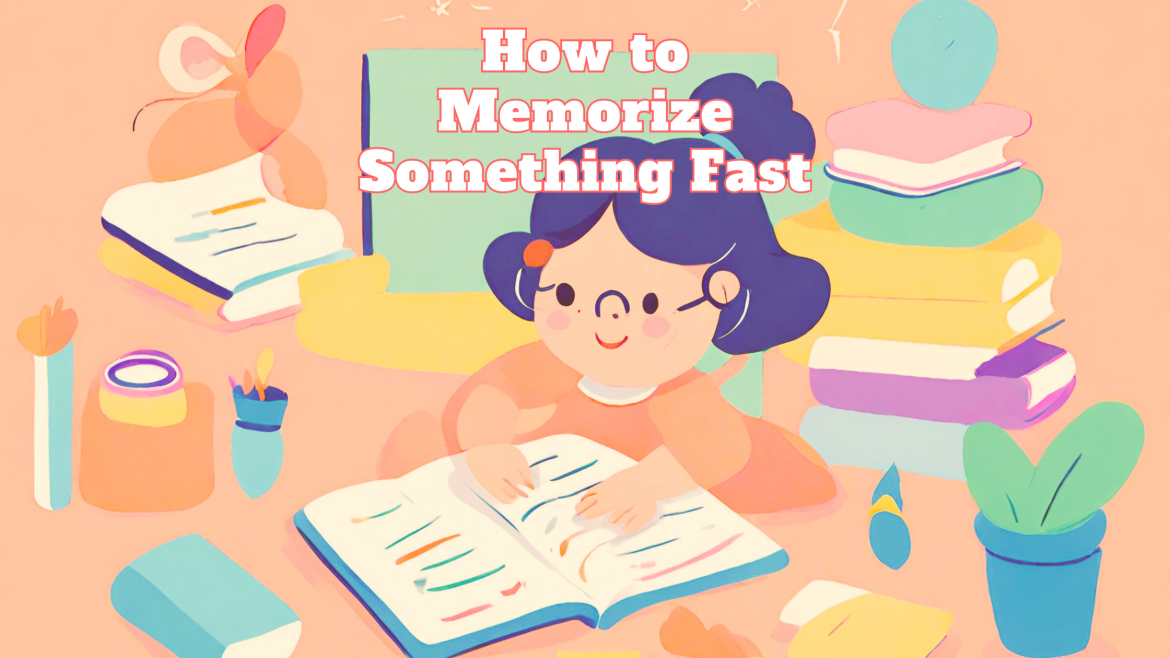
Memorization is at the core of learning; it allows you to recall facts, quotes, or names when asked from memory. Certain individuals seem to have an incredible knack for memorizing information quickly and effortlessly, while it may be more challenging for everyone else. Luckily, there are ways you can quickly memorize something.
MentalUP Brain Games
There are many people offering advice about how to memorize quickly, but many lack any experience or training in memory competitions or learning. Therefore, it’s excellent to advantage of guidelines from individuals who know what they speak approximately.
MentalUP Brain Games is an engaging cognitive app providing entertaining brain training games to increase attention and memory retention. Created by academics and game designers, MentalUP Brain Games includes games to train both visual and verbal skills. The app earned a score of 4.7 inside the app shop and has been downloaded by way of over 10 million children worldwide. Its brain games introduce children to new problems and ways of thinking that help them solve all obstacles put before them while at the same time helping develop English and maths skills.
Memory can be achieved through repetition. Repetition will help cement information in your mind and make recalling later easier. Try linking new knowledge to something you already know – for instance if trying to memorize plant names try associating each with an image or word that easily conjures associations between plants and something in memory.
Preparing The Space
Your mind works like a hard pressure: it may most effectively keep so many statistics at any person’s time. Therefore, when trying to remember complex formulas or numbers – or any other information for that matter – using strategies like using mnemonics, sleeping to consolidate memory consolidation, interleaved repetition practice, or the memory palace technique won’t help as quickly.
Connecting new information with something you already know – what’s known as a connection mnemonic – will make remembering it much simpler for your mind. I once used this strategy to remember an unfamiliar scientific concept by linking it with an image I knew such as water expanding at low temperatures.
Irish Reading offers this blog post to provide more insight into the process of memorization. Their memory experts have assisted thousands of students from Ivy League schools and professionals from Fortune 500 companies to improve their memory and increase productivity, so register today to start taking their specialized course!
Recording Your Study

Your brain only has so much room for memory storage; however, simple memorization techniques that anyone can employ can help increase retention and productivity. One of the most a success strategy is the use of mnemonics – easy tricks designed to assist humans bear in mind facts via associating them with something else.
For example, when trying to recall chemical elements such as hydrogen or oxygen, connecting their names to things that sound similar such as “hydrant”. This method works for visual, auditory, and reading/writing learners alike.
Repeating information can also help. Do this immediately after learning it and again 20 to 30 minutes later; in between repetitions, take some time for rest or something new to do; repeat six to eight hours after your initial learning session. Self-testing yourself by asking questions about the material is also helpful for ensuring a comprehensive understanding, rather than simply an accumulation of facts and details in your head. Employing this technique will prevent forgetting key pieces of knowledge at times when needed most.
Writing Everything

Writing something down helps us remember it better, and putting pen to paper helps unburden all those thoughts swirling in your head – from to-do lists and daily reflections, all those pesky little random thoughts can now be written out on a sheet of paper and thus take some strain off our shoulders.
When trying to remember information it’s essential that you write everything down – even if it does not make sense – because this stimulation stimulates your brain and can speed up learning faster. This system of memory retention known as the Reticular Activating System helps keep memories intact by just typing them out on a computer.
Sectioning notes is another helpful strategy for visual learners, enabling them to break up information into manageable chunks that are easier to memorize. You could even use a mnemonic like Please Excuse My Dear Aunt Sally (parentheses, exponents, multiple divisions, add/subtract). This will ensure better comprehension and retention.
Sectioning Notes
Memorization is an essential element of learning, and often the first step toward becoming an excellent student or worker. But memorization can now and again be difficult and time-eating – this is why it’s far important that you realize a few simple tips that can assist accelerate this procedure.
One way to don’t forget information extra without difficulty is to divide up your notes into companies, making it easier to recall person bits of knowledge. Another trick is linking it with something familiar – for instance, if you need to recall that water boils at 212deg Fahrenheit you could connect that fact to someone you already know like their phone number or an interesting story about a notable figure.
Quiz yourself to assess how much of the material you know. Don’t just rely on reading or hearing it before; make an effort to recall every last detail! Quizzing also allows you to identify areas for improvement so you can practice memory techniques to strengthen them further. Taking breaks may help relax your mind and enable you to recall more easily later.
Using Pictures
Many people offer advice on how to memorize quickly, but few have competed in memory competitions or completed degrees themselves. You need advice from real-life memory experts and not mere theory experts! One effective strategy for learning faster is relying on vivid visual images to engage our brains’ visuospatial center and facilitate memory. You can use images in many different ways: drawing them, placing them on yourself (such as a necklace or bracelet), using color to accent them, or even adding touch, smell and sound sensory triggers can all help us recall information more quickly.
An acronym can also help us remember something more easily, which can be particularly effective for numbers and dates. For instance, remembering the order of planets may be easier using an acronym such as MVEMJSUN instead of having to remember all their names individually.
Images can help auditory and visual learners alike to quickly recall words and phrases more quickly. Associating the word with an image makes it more memorable; imagine, for instance, an image depicting pegs with numbers next to them so you’re quicker at recalling its contents.
Repeating Often
Memory tricks to fast-memorize something can come in many forms, whether that means names at an event or your to-do list. Some methods include using rhymes and linking information back into previous learning; repeating what has been read out aloud; reciting material several times over and teaching it to someone else.
Rhymes can be an effective way of memorization because they’re so easily recallable. Acronyms like “MVEMJSUN” (Mercury-Venus-Earth-Mars-Jupiter-Saturn-Uranus-Neptune) may help make material more memorable while making writing down simpler as well as making things easier to remember.
Repeatedly repeating information will not help your brain encode and store new knowledge, so to improve memory you should try spaced repetition; by staggering the frequency with which you review material; take breaks between study sessions to allow your mind to retain what it has learned; teach it aloud or record yourself and play back – these methods all give your mind time to process new material more effectively than simply memorizing rotely! Finally, teaching someone can also be an excellent way to retain information – forcing you to process it differently and retaining more deeply than simply rote learning alone would do; try teaching it aloud to friends or family or even recording yourself so later rewatch it later when listening back or watching yourself explain things aloud!
Teaching to Someone

Some people seem to possess a photographic memory, while anyone can learn how to develop theirs over time with dedication and hard work. Step one in developing effective memory techniques is understanding your learning style and developing techniques to aid memory retention faster. Mnemonic devices or memory palace techniques may be effective ways to encode information in your mind more quickly; spaced repetition practices may help combat forgetting curves as well.
Break your material down into sections for easier understanding. This method works well for visual learners as well as traditional learners; for instance, if you need to recall four plants’ names quickly, try grouping them alphabetically or according to color for easier recall.
Quizzing yourself regularly will help identify areas in which more effort must be applied to memorizing things but beware not to do this immediately after trying something out – allow some time, maybe an hour or more, before testing yourself again.
Listening Recordings

Memorization is at the core of learning. All other abilities, like crucial questioning and hassle-solving, draw upon facts stored in memory – which explains why young children can effortlessly memorize nursery rhymes without completely comprehending every phrase manner.
When trying to recall things faster, try associating them with images or using mnemonics–systems and tricks used to make information memorable. When learning the names of plants, for instance, try linking each to an image easily recallable; alternatively, you could connect each plant’s initial letter(s) with a word or phrase, such as garlic, rose, hawthorn, and mustard (GRHM).
Practice these tips will help you learn quickly, but for optimal memory retention, it’s essential to seek expert advice from someone like Irish Reading who has helped thousands of students and professionals enhance their productivity by increasing memory retention.
Taking a Break
Memorizing information has by no means been greater vital in an age where records may be easily located online; memorization lays the groundwork for essential wondering and problem-solving abilities.
Memorization must become part of everyday learning to allow accessing foundational skills like critical thinking and problem-solving. Memorizing is equally vital whether you’re studying or working professionally as slips can be embarrassing if not costly in some instances. Try different techniques to enhance your memorization ability. Break your notes down into sections, use mnemonics, or interleave different tasks; and don’t forget to take breaks if you start feeling overwhelmed! It is also important to take breaks when necessary and to take regular breaks when possible if things become overwhelming.
One way to make your breaks more efficient is by setting a timer. This can help you stay on top of how much time is left until returning to study and can increase productivity. While taking a break, try reading non-related material such as books or magazines – anything interesting but non-absorbing that you can put down easily when your timer goes off is ideal!
Clearing Your Head
Memory palace technique to help with recall. There will be many things in your life you’ll need to memorize: names of important people or events; lists (to-do, shopping lists, etc), facts for tests or projects at work, and passwords – to name but a few! However, with some simple techniques you can improve your ability to commit information to memory: sleeping to consolidate it further; using mnemonics; linking past information together consciously reviewing it over time, and memory palace techniques like Sleep-to-Recall!
One way to memorize faster is using the loci method, which involves associating what you need to remember with an easily recognized place or object – for instance, if it’s flowers you need to remember, perhaps think of them growing along a well-traveled path; or associating words with objects around your home – This approach makes the task of moving information from short-term into long-term memory much simpler and successful; you will find that with each review session, less information will be forgotten!
Mindfulness
Mindfulness is the exercise of taking note of the present second and being gifted along with your respiration, mind, body sensations, and something else you hit upon around you in that unique second. One of the primary reasons that people forget information is due to failing to retrieve it when needed. One effective strategy to help recall new material when necessary is associating it with something you already know – for example, if trying to recall the boiling point of water at sea level, try linking it to something familiar such as your friend’s phone number first three digits to help cement its memory in your brain. This may help it stick.
Be mindful that during mindfulness practices, your mind will wander. This is perfectly natural and necessary – simply bring back attention to breathing or a mantra when this occurs. As more time is dedicated to mindfulness practice, the more proficient you will become.
Relating Things
Memorization is one of the key talents required for effective studying, serving as the basis for other competencies like important wondering and problem-solving. Unfortunately, however, many individuals find memorizing difficult or dull materials challenging.
To help make learning material easier, try linking it with something familiar to you – this technique is known as substitution and works great when used for words, numbers, or even speeches! For instance, when trying to remember hydrogen elements such as “hydrant”, for instance, kinesthetic learners might even create physical associations like standing next to a bright red fire hydrant on the street!
Make the connection more vivid by engaging multiple senses. For example, try associating information with smell or touch; more ways memory is encoded will lead to stronger retention of information.
Avoiding Multi-tasking
Studies have demonstrated the effects of multitasking can be detrimental to memory retention. In addition, remove anything unnecessary from your desk/workspace such as emails or files not related to the current tasks. This method may seem unusual at first, but it will aid your memorization process immensely. By forcing yourself to read and hear information that needs to be remembered, this technique utilizes all senses for better recall.
Once you’ve studied the information, wait 24 hours and then review it once more. This will reset the forgetting curve, helping you memorize faster while also reinforcing its understanding better – increasing its likelihood of sticking in your memory. Alternatively, self-testing offers similar benefits, but without reference materials as support.
Understanding The Process
Memorization is an integral component of learning that helps you comprehend new information. Furthermore, it aids your daily life by recalling facts and data as needed. Unfortunately, many people still rely on outdated methods of memorizing things which end up producing poor results.
Understanding how your brain works is the key to memorizing quickly. Once you do that, it becomes easier to find a method that suits you best – for instance, if you’re an auditory learner you may benefit from studying with others or using podcasts/audiobooks; visual learners might benefit from using mnemonic devices, and creating memorable images; kinesthetic learners could try taking notes by handwriting, as opposed to digitally.
Change of environment may also help, such as reviewing the material in a different room or at different times of the day, as this will force your brain to associate information with different settings, making recall easier later. Finally, spaced repetition is an effective strategy for combatting the forgetting curve and making sure information stays with you long-term.

